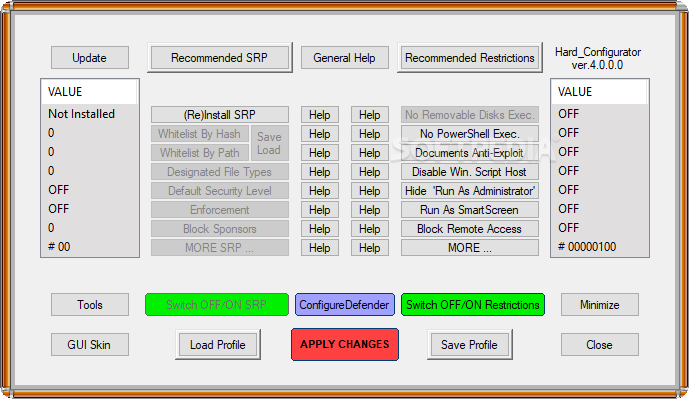Besides Cfw/cs is there any standalone software that is considered Default/Deny or can be configured that way?
Just curious as many here like the concept.
Just curious as many here like the concept.
Besides Cfw/cs is there any standalone software that is considered Default/Deny or can be configured that way?
Just curious as many here like the concept.

How is Simple SRP compared to H_C SRP?This is another one I've also used, Simple Software-Restriction Policy.
IWR Consultancy : Simple Software-Restriction Policy
See our downloads page for the latest release.iwrconsultancy.co.uk
It's also very strong but I like it more H_CHow is Simple SRP compared to H_C SRP?
To round out the list of default/deny apps, we could add:
ReHIPS
Excubits Bouncer
SecureAPlus
I love VS,Hard_Configurator – GUI to manage Software Restriction Policy (SRP) and harden Windows
hard-configurator.com

Download Hard_Configurator 5.0.0.0
Download Hard_Configurator - Manage the Software Restriction Policies more efficiently and make sure that the system is protected against all sorts of threats via this toolwww.softpedia.com
I don't understand the advantage to Comodo Cloud. In VoodooShield, at default settings, all unknown files are automatically blocked. There is no prompt. You can manually allow them only if you go out of your way to do so, just like with CCAV. And blocking is much stronger than sandboxing. So what's the advantage to CCAV?I love VS,
the reason im currently preferring Comodo Cloud over VS is for 1 simple reason.
unknown files are ran sandboxed 'automatically', whereas on VS > if you allow the wrong unknown file - You're toast.
Appguard, it is simply the best. If you have a lifetime license you are very lucky.
The difference is,I don't understand the advantage to Comodo Cloud. In VoodooShield, at default settings, all unknown files are automatically blocked. There is no prompt. You can manually allow them only if you go out of your way to do so, just like with CCAV. And blocking is much stronger than sandboxing. So what's the advantage to CCAV?
I have a lifetime license for AG version 4 but don't use it since it has been discontinued. If you use an internet security suite like Kaspersky (Trusted Applications Mode) or ESET(with HIPS) you won't require AppGuard if you know how to configure them properly.Appguard, it is simply the best. If you have a lifetime license you are very lucky.
I see. Thanks for the explanation.The difference is,
If you allow an unknown file on VS it runs as normal, outside a sandbox.
On CCAV, even allowing an unknown file, it still runs inside its containment.
Correct me if I'm wrong but you have to manually add the file to the trusted files to have an unknown file run outside its containment.
Both CCAV & VS offer default deny, but the difference comes when allowing the unknown/untrusted.
Simple SRP has very limited configurations compared to H_C. But since both are utilizing Windows built-in SRP, technically you can configure them any way you want as long as Windows permits it.How is Simple SRP compared to H_C SRP?
@BoraMurdar Can you post the link on those CCAV tweaks. Would like to try them out with AG v4. Thanks!
Default allow is much better suited to the average user.
Anti-executable products are the domain of advanced users. Average users cannot handle them and they get themselves into trouble. Every single time someone I know installs a default deny product, I end up getting a call.
If there is an exception I would say it is virtualization. They can handle virtualization, more or less.